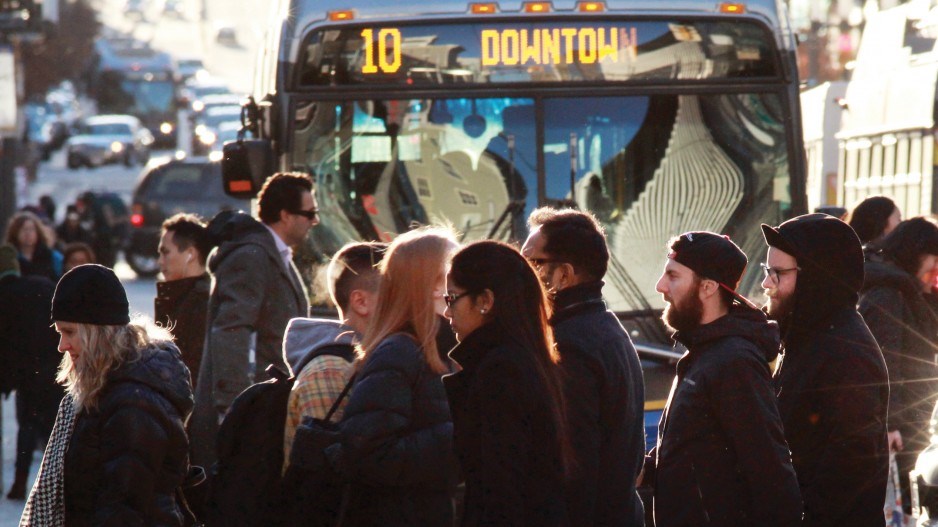“Ugh.”
That’s all the executive director of the Mayors’ Council wrote in a July 2 email to a TransLink executive vice-president, under the subject “No 62; yes 38.”
Mike Buda’s short 10:06 a.m. message expressed the agony of defeat to Bob Paddon, right after Elections B.C. announced Metro Vancouver voters had rejected a sales tax hike to fund a third of the cost of TransLink’s expansion wish list.
The mail-in plebiscite was the dominant Lower Mainland story in the first half of 2015. Proponents of the $7.7 billion, 10-year transit and transportation-building plan failed to overcome public outrage about TransLink governance and management and SkyTrain service outages.
Buda’s email message was among many released under Freedom of Information, offering a glimpse behind the scenes of the $6-million, public-funded Yes campaign.
On May 21, more than a week before the May 29 voting deadline, Buda was trying to clarify his contract (capped at $150,000 through June 30) while TransLink planners were gearing up to canvass voters at major transit hubs during the next day’s afternoon rush. But, late that night, SkyTrain’s Expo Line suffered another outage. A track-grinding machine’s spark lit an undiscovered bird’s nest and the fire spread to cables.
Bob Ransford, who was paid $90,322 to manage the campaign, dreaded the ensuing negative publicity.
“Just the thing we need for those last few undecided voters ready to mail their ballots today,” he wrote at 5:27 a.m. to Buda and Marnie McGregor, a Vancouver city hall bureaucrat seconded to the campaign.
On May 28 and 29, with time running out, Buda was juggling a variety of tasks, from email account deactivation and archiving to ordering catered snacks for an upcoming meeting at Metro Vancouver.
“You were THE key member of the team,” Buda wrote at 7:21 p.m. May 29 to McGregor. “More on that later… I can’t feel closure and say good byes on this till we get those damn results and know where things are going next. Only 4 short weeks! Ugh.”
Fast forward to the July 2 decision day. Space had been booked for Yes campaigners to celebrate at Simon Fraser University’s downtown campus. But, more than an hour before the release of results, SFU Centre for Dialogue director Shauna Sylvester told Buda and others not to bother.
“I don’t think we are going to need it! I understand that it is a no!” Sylvester wrote.
Buda: “Where did you hear that?”
Sylvester: “Peter Robinson [Better Transit and Transportation Coalition co-chair] on Tuesday night. It would be great if it was wrong. I’m being contacted by media through SFU. I’d love any key messages.”
Buda: “Well, we are certainly expecting a no based on polls, but no one has yet heard actual results. We have been told they will give us a heads up shortly before 10. We will see.”
Sylvester: “Any chance Peter is wrong?”
Buda: “I have no idea! I would be surprised if the BC Govt or the independent elections commissioner would share highly confidential results with the [CEO of the David Suzuki Foundation], though. But anything is possible on B.C.”
The B.C. cabinet ordered the plebiscite without fundraising limits or disclosure requirements. The Mayors’ Council claimed it spent $5.8 million of its $6-million budget. BTTC told donors it budgeted $835,000, but later admitted it raised only $261,743. The Canadian Taxpayers’ Federation led the No campaign and boasted spending just under $40,000.
Buda claimed the Mayors’ Council had no time to conduct open, public tendering, so it picked from a list of pre-approved suppliers. The biggest contracts went to advertising placement agency Mediacom ($1.7 million) and Stratcom ($1.5 million), the pollster, robocaller and telephone town hall host behind Gregor Robertson’s three Vision Vancouver mayoralty wins. Stratcom employed a variety of sophisticated techniques. Its May 26 invoice for $42,242, for example, revealed that it billed for services such as “appending gender, ethnicity and dwelling type” to phone lists.
But many voters were not amused by the robocalls. Richard Walton, Robertson’s predecessor in the Mayors’ Council chair, said he gladly participated in a telephone town hall, but he got more than 30 angry emails in five days.
“Mike, please stop the robocalls being made using my recording,” wrote Walton, the North Vancouver District mayor, on March 22. “I do not believe in this practice and had no idea when I recorded the TownHall message, this would have been the outcome. This is backfiring on the North Shore and I am getting the calls personally.”




